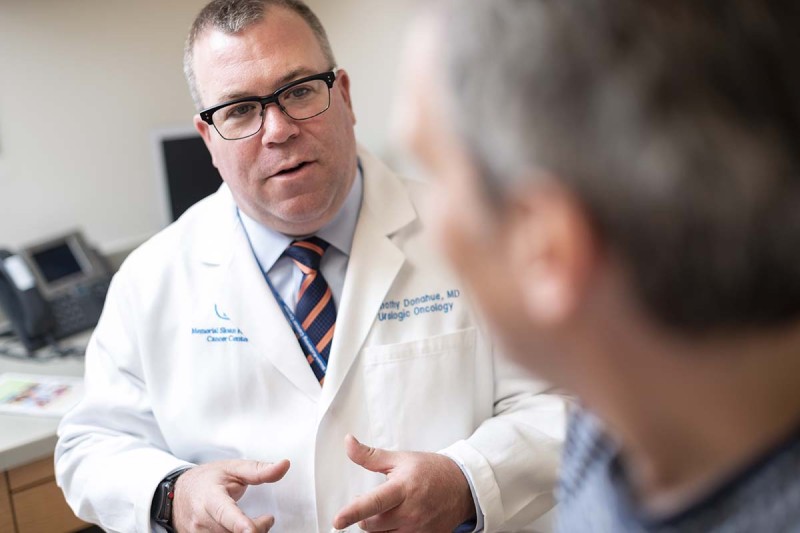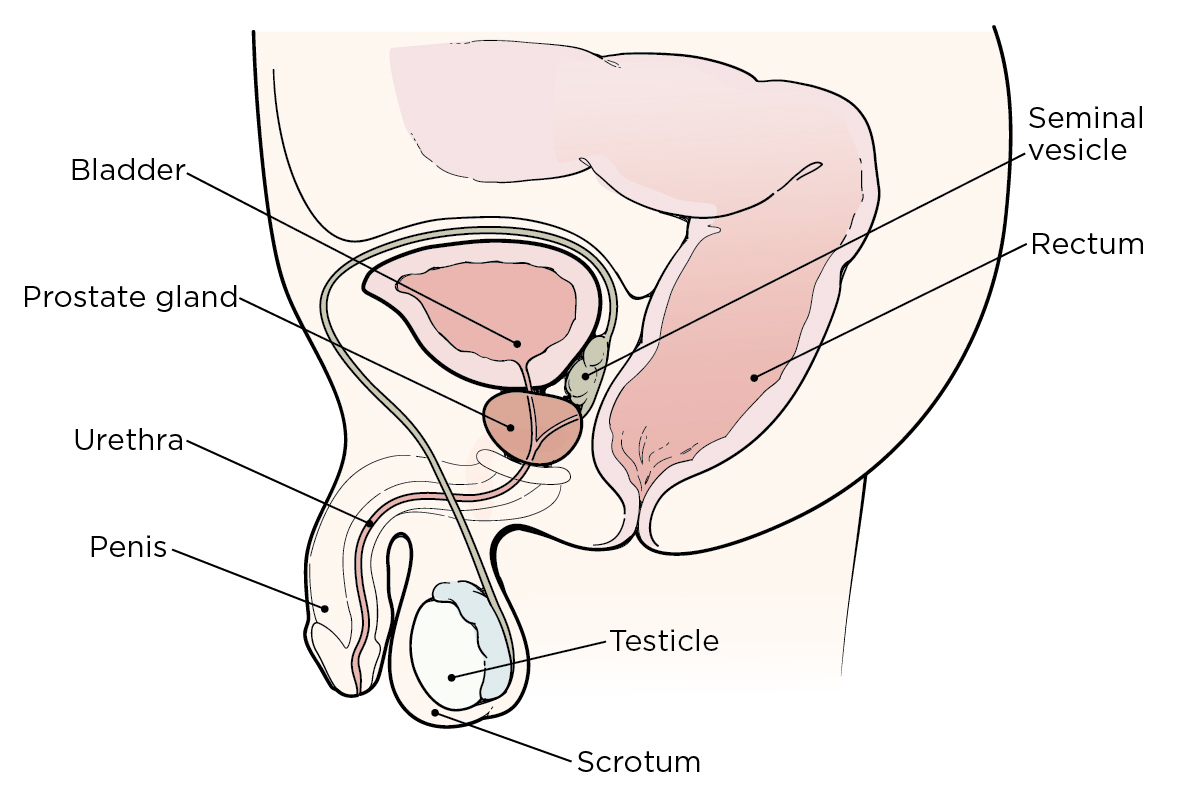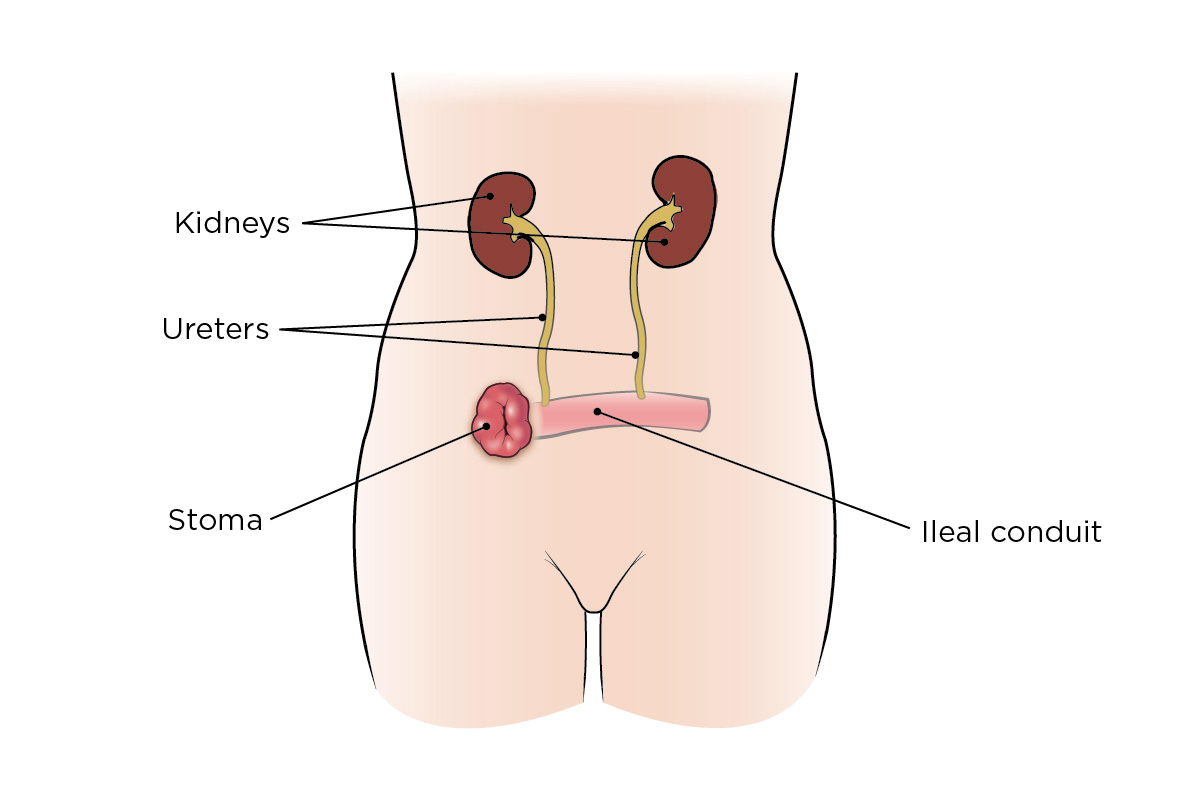
Surgery treats and removes bladder cancer that has not spread to other parts of the body. MSK bladder surgeons are experts in the most advanced ways to remove bladder tumors.
During your treatment, you will hear about parts of your urinary system. It’s made up of organs, such as your bladder, that make, store, and remove urine:
- Your kidneys clean the toxins out of your blood and make urine (pee).
- Your ureters are tubes that carry urine from your kidneys to your bladder.
- Your bladder stores urine until you feel the need to urinate.
-
Your urethra is a tube that carries the urine in your bladder out of your body when you urinate.
- In women, the urethra is very short. It’s located above the vagina.
- In men, the tube is longer. It passes through the prostate gland and penis.
Types of Bladder Cancer Surgeries
Transurethral resection of a bladder tumor (TURBT)
Transurethral resection of a bladder tumor (TURBT) is the most common surgery for bladder cancer. It treats early-stage bladder cancer that has not grown into the muscle.
How does a transurethral tesection work?
Your surgeon will put a thin, hollow, lighted tool called a cystoscope into your urethra. This is the tube that carries urine (pee) from your bladder to outside your body when you urinate.
Your surgeon can remove the bladder tumor using a tool in the cystoscope.
After the TURBT procedure, you can go home the same day or by the next day.
Your tumor sample will be sent to an MSK pathologist. They will look at the sample under a microscope to make a diagnosis. They can help decide if you need more treatment. After the TURBT procedure, you can go home the same day or by the next day.
TURBT may be the only treatment you need for bladder cancer that has not grown into the muscle. We may also recommend other treatments to lower your risk of cancer coming back. They include bacillus Calmette-Guérin therapy or intravesical chemotherapy.
Bladder Cystectomies
A cystectomy is surgery to remove the bladder when the cancer is aggressive, growing and spreading quickly. A partial cystectomy removes only part of the bladder. A radical cystectomy removes the entire bladder. Your surgeon also may remove nearby lymph nodes and organs in case they have cancer cells. After your bladder is removed, your doctor will make a new pouch to hold your urine, called a urinary diversion.
- MSK surgeons often can make a new bladder at the same time, called a neobladder.
- MSK surgeons can use a piece of your colon (large intestine) to make a pouch, called a continent cutaneous diversion.
Partial Cystectomy
A partial cystectomy removes only part of the bladder. It’s an option if:
- The tumor has grown into the bladder wall in just 1 area.
- That area can be removed without harming how your bladder works.
Radical Cystectomy
A radical cystectomy removes the entire bladder. It treats cancer that has spread into the muscle of the bladder wall or beyond. This surgery is the best chance for a long-term cure. Your surgeon will make you a new bladder or a pouch to hold your urine.

Your surgeon may also take out nearby lymph nodes and organs. This can help prevent the cancer from coming back or spreading to other parts of the body. Lymph nodes are small, bean-shaped glands in your body. They’re a part of your body’s immune system called the lymphatic system.
Bladder removal can be done through a small incision (cut) in the lower abdomen (belly). Or, we may use minimally invasive procedures, such as robot-assisted surgery. Minimally invasive surgery means it’s done with a series of small incisions. Surgeons at MSK are experts in both open and minimally invasive surgery.
Radical cystectomy for males
- Your surgeon may need to remove the prostate and seminal vesicles. These are the small glands near your prostate that make the fluid in semen.
Radical cystectomy for females
- Your surgeon may need to remove your uterus, ovaries, and some of your vagina.
MSK urologic surgeons do a large number of radical cystectomy operations every year. Research shows surgeries are more successful when they’re done by surgeons who are very experienced.
Bladder Preservation: Neobladder & Urinary Diversion
Neobladder
During a partial or radical cystectomy, your surgeon often can make a new bladder, called a neobladder. This often means you will not need a pouch outside your body (ostomy bag or pouch) to collect urine (pee). Many people are good candidates for a neobladder reconstruction, although some conditions prevent your doctor from offering this option.
How is neobladder surgery done?
Your surgeon builds the neobladder from part of your small intestine. They attach one end of your neobladder to your ureters. The other end is attached to your urethra. After your surgery, your urine will flow from your kidneys, through your ureters, and into your neobladder.
Most people with a neobladder can urinate normally. A small number of people put a catheter (tube) through the urethra into the neobladder to empty it all the way. Your MSK care team will teach you how to do this after your surgery. You will not need a pouch outside your body to collect urine (pee).
If your surgeon removed your urethra, they will connect your urinary diversion to the abdominal wall. This will need either an ileal conduit with a stoma, or a pouch you will catheterize to remove urine. You will not need a bag outside your body. A stoma is a small opening in the skin of your abdomen wall.
Urinary Diversion (Continent Cutaneous Diversions Such As the Indiana Pouch)
If a neobladder is not recommended, there are other ways for urine to leave your body. Your doctor can create a new pouch to hold your urine after they remove your bladder, called a urinary diversion.
In a continent cutaneous diversion, MSK surgeons create a pouch. They use a small piece of your colon (large intestine) and small intestine to form a pouch to store the urine.
How is a urinary diversion done?
Your doctor will attach one end of the pouch to your ureters. The other end will be attached to a small opening in your abdomen called a stoma. Your doctor will create the stoma during your surgery. They’ll also create a valve to keep urine from flowing out of the stoma.
You won’t need to wear anything outside of your body to catch the urine. Often, our surgeons can make the opening in your belly button so it’s less visible to other people.
After your surgery, your urine will flow from your kidneys, through your ureters, and into your pouch. To empty your pouch, you’ll put a catheter (thin, flexible tube) through your stoma several times a day. You’ll learn how to do this after your surgery.
This surgery usually takes about 4 to 7 hours.
Ileal Conduit

An ileal conduit is the best option for some people. After your bladder is removed, your surgeon will make a new passage where urine will leave your body. This is called a urostomy.
Your surgeon will use a small piece of your intestine called the ileum to create the ileal conduit. They will attach one end of the ileum to your ureters. These are the tubes that carry urine from your kidneys to your bladder.
The other end will be attached to a small opening in your abdomen (belly) called a stoma. Your surgeon will create the stoma during your surgery. Urine flows through the ileal conduit into a bag outside your body.
Support in Caring for a Stoma
Our nurses will support you during your recovery. Your wound, ostomy, and continence (WOC) nurse will:
- Answer your questions.
- Teach you how to care for the stoma.
- Explain how to change your urine collection pouch.
After you leave the hospital, you will have follow-up appointments. They can be home visits, if needed.
Deciding on Treatment After a Cystectomy
MSK offers a bladder cancer prediction tool called a nomogram. It can help predict cancer treatment results. Our nomogram can help your doctor decide if you need more treatment after your bladder was removed.
Use MSK’s nomogram for Bladder Cancer: Risk of Recurrence Following Surgery
MSK’s nomogram estimates the risk of bladder cancer coming back. People with cancer can talk with their doctor about using this tool. It can help you understand the chance of bladder cancer coming back 5 years after your surgery.
Preserving Sexual Health
It’s important to think about sexual health when we plan your treatment. Our bladder cancer surgeons are specialists in keeping your body working as well as possible after treatment. Their goal is to preserve your sexual function (having sex). Our sexual health team will support you and help manage these side effects.
Quality of Life After Bladder Removal Surgery
People who had their bladder removed at MSK recovered well and enjoyed a high quality of life within 2 years. These excellent long-term results from a team led by urologic surgeon Bernard Bochner were reported in a study published in 2022. Hundreds of MSK patients who had a radical cystectomy between 2008 and 2014 were surveyed.
People were asked about quality-of-life issues after a radical cystectomy, including:
- General quality of life
- Urinary function
- Sexual function
- Bowel function
- Body image
- Mental and emotional health




